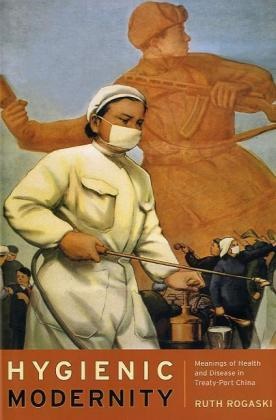Read more
Zusatztext "By exploring both the transformations that took place in the understanding of weisheng [protecting life/vitality] and the changing nature of the lives of the people of Tianjin, Rogaski offers a nuanced picture of Chinese society during a century of tremendous upheaval . Hygienic Modernity is an important and fascinating book. It should be read by all scholars interested in the histories of modern China and Japan and by those investigating the development of public health in East Asia." Informationen zum Autor Ruth Rogaski is Associate Professor of History at Vanderbilt University. Klappentext "Brilliantly conceived and superbly researched! this excellent study charts the transnational forces and circulating discourses on health that helped constitute a modern concept of hygiene in China. Over the course of the twentieth century the state! scientists! physicians! and the military all came to participate in the health management of aggregated populations! and eventually in the fitness of the race and nation. Insightfully placed within the context of a global modernity and the layered imperialisms of Japan and the "West!" this is transnational history writing at its best. Indeed! it is one of the finest books we now have on modernity in East Asia."-Takashi Fujitani! University of California! San Diego! and author of Perilous Memories: The Asia-Pacific War "Rogaski examines health and disease in the northern Chinese city of Tianjin! from the years before it was opened as a treaty port to the early People's Republic. She shows how weisheng! or "hygienic modernity!" was adopted by foreigners and local elites in the service of imperialism! national strength! and revolution. Hygienic Modernity breaks new intellectual ground in our understanding of imperialism! providing local texture and transnational reach. It is ingeniously researched and elegantly argued."-Gail Hershatter! author of Dangerous Pleasures: Prostitution and Modernity in Twentieth-Century Shanghai Zusammenfassung Placing meanings of health and disease at the center of modern Chinese consciousness, this work reveals how meanings of weisheng, with the arrival of violent imperialism, shifted from Chinese cosmology to encompass such ideas as national sovereignty, laboratory knowledge, the cleanliness of bodies, and the fitness of races. Inhaltsverzeichnis List of Illustrations Acknowledgments Prologue: Sun the Perfected One's Song of Guarding Life Introduction 1. "Conquering the One Hundred Diseases": Weisheng before the Twentieth Century 2. Health and Disease in Heaven's Ford 3. Medical Encounters and Divergences 4. Translating Weisheng in Treaty-Port China 5. Transforming Eisei in Meiji Japan 6. Deficiency and Sovereignty: Hygienic Modernity in the Occupation of Tianjin! 1900-1902 7. Seen and Unseen: The Urban Landscape and Boundaries of Weisheng 8. Weisheng and the Desire for Modernity 9. Japanese Management of Germs in Tianjin 10. Germ Warfare and Patriotic Weisheng Conclusion Glossary Notes Bibliography Index ...

